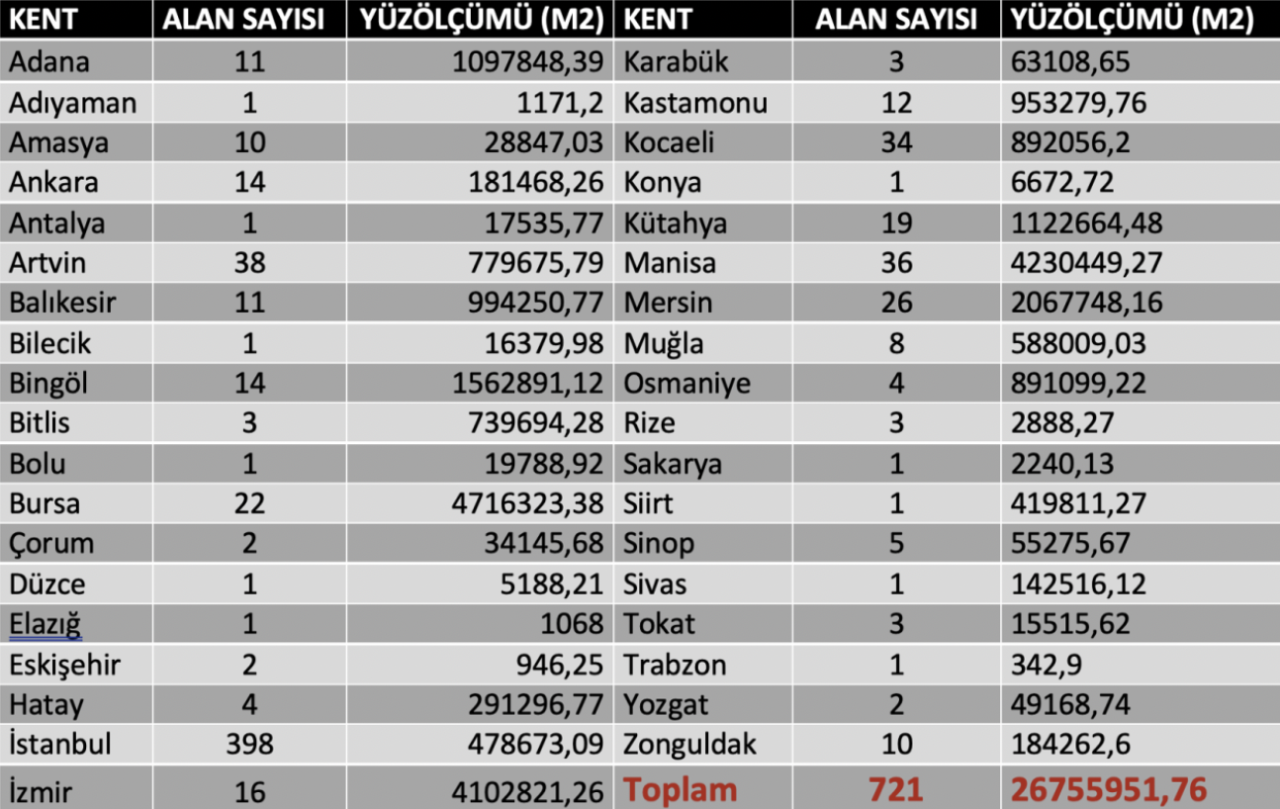Plots, farmlands, and forests: The real existential threat to Turkey
One person from the Republic of Turkey singlehandedly removed the forest status of 721 plots of land, totaling 26.7 square kilometers across 37 provinces, and put them up for sale. Could there be a more terrifying power?
Land, fields, forests… Reserve areas, the leasing of agricultural lands, Article 16 of the Forestry Law…
After transitioning to the presidential system, it became necessary to pay closer attention to what happens with the country’s land, where significant changes are taking place. Calling it urban development profiteering is not enough. A planned, steady transformation spread over the years is being implemented. Geography is being remapped through seemingly unrelated legal regulations. The status of the land is being altered, leading to the largest property transfer across the country.
So, what is the government doing? The fragmented presidential decrees we read in the Official Gazette, with maps added as if drawn in a void on a blank sheet of paper, reveal a certain reality.
In the last ten years, there have been fundamental changes to three key laws directly concerning the status of Turkey's land mass. Since 2018, critical revisions have been made, significantly expanding the powers of Recep Tayyip Erdoğan.
The first is the 2012 Urban Transformation Law, which led to significant debates and reactions following the redefinition of "reserve areas" at the end of last year. Just looking at what happened in the southeastern province of Hatay is enough to understand the consequences. The second is the 2014 amendments to the Soil Protection and Land Use Law. A related regulation was issued last month, allowing the leasing of agricultural lands that have not been cultivated for two years. The third is the Forestry Law. In 2012, the infamous "2B law" was enacted, allowing the sale of lands that had lost their forest status. In 2018, a critical addition was made to the Forestry Law. With Article 16, Erdoğan was granted the authority to exclude any area from the forest classification at his discretion.
Many similar laws could be listed. Laws concerning pastures, water resources, mining, energy, tourism, villages and metropolitan cities, industrial zones, incentives for Organized Industrial Zones (OSBs), land registration, and even citizenship... When you examine the outcomes of each of these over time, the picture remains consistent: the status of the land is being redefined.
Let us now take a closer look at one of these. Using the meticulous studies conducted separately by Prof. Dr. Erol Köktürk, a Geomatics Engineer, and Forest Engineer Yücel Çağlar, let’s summarize what has happened in the forests, particularly after 2018, a topic that has resurfaced due to the massive wildfires.
Article 16 Opens the Door To Disaster
With the 2/B law of 2012, a total of 4,734 km squares of land was removed from the forest designation and sold. Only 4.7 percent of this land had settlements on it. These areas were opened to construction through subsequent zoning amnesties and new zoning plans. The government convinced the public that, as cities grew, much of the land designated as forests had lost its function, and that long-standing zoning issues needed to be resolved. However, it became clear when the presidential system was implemented that the issue was not about solving a problem for the citizens. In 2018, a new Article 16, even worse than 2/B, was added to the Forestry Law. In summary: Erdoğan now could remove any area from the forest classification and sell it at will. He held all authority to determine the criteria.
The vast loopholes in both laws reveal why there is a planned, systematic attack on forests. What is this loophole? The duration of these practices is undefined. They did not even bother to write it down. Yet both laws are justified by past circumstances. When you mention "degraded forests," you’re not referring to something future-oriented.
So, what does this mean? Is the country continuously producing land that has lost its forest status? Are meteorites falling, volcanoes erupting, or massive landslides happening every year? Are forests drying up due to climate change? During wildfires in the country's western shore, the government immediately stated that it would not sell the areas or open them to construction. “We will reforest them,” it promised. So how does Erdoğan keep finding areas that have lost their forest status every week by simply looking at a map?
Between 2018 and August 2024, Erdoğan used this authority 27 times. One of these was under the parliamentary system, and the rest were under the presidential system.
In the Republic of Turkey, an individual singlehandedly removed the forest status of 721 plots of land, totaling 26.7 square kilometers across 37 provinces, and put them up for sale. Could there be a more terrifying power?
Moreover, this power should be considered ‘exceptional’ or ‘temporary,’ beyond daily economic and political decisions. Even in the event of a coup or an invasion, this is a power that an occupying force might hesitate to use.
When we look at the provinces involved, we see that these decisions are concentrated in regions rich in forests. We also notice something else. In six years, 61 percent of the plots that lost their forest designation are smaller than 1,000 square meters. Some are as small as 5.8 or 8.1 square meters. This means that a personalized government is committing forest destruction tailored to individuals, establishing a criminal partnership from the top down.

Much more could be said about what is happening to the forests. But it must be emphasized again that we are facing more than just a severe case of deforestation. A process of 'land privatization' is rapidly unfolding, which will affect future generations and every aspect of social life.
Those who constantly speak of sovereignty, national unity, and the land watered with the “blood of martyrs” should take a closer look at the tangible, visible changes happening to the land of the country. The real “existential threat” lies here.

